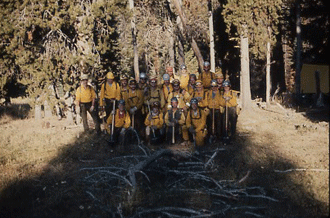This is the year-end letter I sent in 1988 about a fire crew’s life after a major fire.
December 1988
Dear Friends and Family,
When I returned to Washington D.C. last year after fighting fires in Oregon, I signed up with a Virginia George Washington National Forest Fire Crew. We were all excited when we were called up to fly to Yellowstone this summer. Alas, our plane in Roanoke had a malfunction and while we waited on the tarmac for eight hours our destination changed to Lewis and Clark National Forest’s Canyon Creek Fire, a forest most of us had never heard of.
After 22 hours of travel, we arrived at the fire camp near Augusta, Montana. We were promptly assigned the night shift, a shift that lasted 36 hours. In 12 hours the fire almost quadrupled in size. Over 140,000 acres burned in one evening. More than 120 firefighters had to deploy fire shelters as flames rolled over them and the fire camp itself burned. By the end of the day, over 247,000 acres had burned, over 40,000 of them on private land, including six cabins, tons of hay and grass, over 100 head of cattle, and millions of board feet of timber. Local people blamed the Forest Service for not putting the fire out in June when apparently a ranger could have doused it by pissing on it. After getting four hours of sleep out in the open in 90° temperatures we went out the next evening and worked in 20° temperatures and 30 mph winds.
We struggled to dig line while keeping up in the moonless night with a Lewis and Clark supervisor who walked up rocky steep slopes faster than most could walk down a city sidewalk. “I guess you’re not used to the altitude,” he once said as we wheezed behind him.
At one point we were assigned to a helitack crew. That meant we had to do even more hiking because they dropped us off in the middle of nowhere and we had to bushwhack back 40 miles or more.
Eighteen inches of snow, not the work of thousands of firefighters, eventually stopped the blaze. Newspapers reported we were jubilant. We were not. We had no tents, were wet, and cold, and wondered what this meant for our immediate future. Conversations centered on status reports of fires elsewhere and hopes of being sent to them.
All crews but three others and ours were demobilized. We had to stay behind to start forest restoration and rehab work. Eighty people to clean up a quarter of a million acres: what could go wrong?
In an attempt to quickly quell citizen fury, we were sent out immediately to repair fences, rebuild structures, control erosion, and plant seeds before a grand plan was created. Officials feared that if they waited a month, and sent teams out to assess the damage and what repairs should be made, there might be a small uprising. Consequently, chaos reigned.
For the first few days we worked to lessen the damage done by bulldozers that had scarred the region when scratching out huge fire lines, some of them 40 feet wide. As half the crew dug water bars to control erosion and spread seed and fertilizer, the other half struggled to pull down four-foot mounds of dirt with hand tools. “There are over 63 miles of these cat lines,” someone said. “We’ll be lucky if we’re home by Christmas.”
“Why don’t they have small ‘dozers come in and do this work instead?” someone else suggested. Suggestion taken. The next day a small bulldozer knocked down some of the mounds and in the process filled in all of the water bars and dug up all of the seed. The next day we were sent back in to dig out the water bars and plant seeds again. These and other similar scenarios were repeated for the next several weeks.
Once we were flown by helicopter to the top of a mountain and instructed to dig water bars as we walked down. The next day we were given 100 pounds of seed and 600 pounds of fertilizer and instructed to walk up the mountain. At one point they gave us all-terrain vehicles to get to some spots, and they were oodles of fun. Then they decided to give us horses instead saying they were safer–that was until one fellow broke a leg, cracked several ribs, and punctured a lung when he was trampled by a startled horse, and another, startled by a horse, whacked himself in the leg with an axe and required 40 stitches.
People felt abandoned and forgotten. Almost all of the articles about fires in the papers dealt with those still fighting fires in Yellowstone. One day when we were ordering wool-lined snow boots, the Great Falls Tribune reported that we’d already been sent home two weeks earlier.
The labor lacked the glamour usually associated with firefighting, but it was just as hard and dirty. It takes as much energy to swing a Pulaski (a long-handled tool with a blade that’s half hoe and half axe) 18 hours a day when digging water bars as when digging a fire line. Without the threat of imminent danger, though, there was none of the adrenalin boost people have when working on a fire. “I’m a fire fighter, not a rehab specialist,” was the usual grumble.
A morning report that Virginia 19 was on “Initial Attack” brought chuckles. If a fire broke out in the area–unlikely, with the 36 inches of snow–we’d be the first ones sent in to fight it. “And what, give up my seeder for a fire hose!” someone cried. “How dare they think of sending in a crack rehab team to douse flames.”
For a period of time, we did give up our seeders and spent days in knee-deep snow rolling up miles of burnt barbed-wire fencing. I have a new appreciation for cowpokes in westerns who say: “I’m going to mend a little fence.”
We were put up at the Diamond Bar X Dude Ranch, another step to help the Forest Service get in the community’s goodwill by pumping money into the local economy. Twenty of us and all of our gear were housed in a bunkhouse meant to sleep twelve. Although it was crowded and several had to sleep on the floor, it was much plusher than most fire camps. “It sure beats lying in a sleeping bag on huge rocks like we had in the last camp,” one man said right before he rolled off his bunk onto the wood stove and suffered third degree burns on his back. It was the only burn injury the crew suffered all season. He was drunk at the time and didn’t even realize he’d burned himself until the next morning when he was found asleep outside in the snow where he almost got hypothermia.
Usually, fire camps don’t allow alcohol, but since the dude ranch had a bar that was a major source of revenue for the rancher in normal times, and since the Forest Service was trying to make amends it didn’t insist it be closed, and since the only potential bar patrons were the firefighters, fire bosses didn’t insist we avoid patronizing it. Every evening half the crew got rip-roaring drunk.
There was one sawyer on our crew who routinely drank 24 shots a night, slept for four hours, got up the next day, and worked a chainsaw for eighteen hours with as much skill as anyone I’ve ever seen.
I was a teetotaler much of the time because I was going to be dammed if I was going to go out in sub-zero weather to pee late at night. I wish others had worried about this. Robert one evening couldn’t quite make it out of the bunkhouse and peed right on my sleeping bag. For the rest of his fire career, he’ll never live that down.
Robert was the strangest character on the crew. He was a born-again Christian, but he spent more time reading The 1988 Guns Digest than the Bible. He looked at pictures in the magazine the way most men look at Playboy centerfolds. Sometimes he’d talk about bombs he knew how to make. “This particular type will cover most of your everyday needs,” he once said. Bombs for everyday needs? I guess I’m lucky he only peed on me.
Then there was Buddy. He was a sweet fellow, but a bit sex-starved. One day we chatted about various things–cooking, animals, maybe even a little politics–and at the end of the day he said to Steve, our crew boss: “T- and I had several real intellectual talks today, didn’t we, T-?” I said: “Yeah, Buddy figures that any conversation that doesn’t involve sex is intellectual.”
There were five women on the crew. We were all in the same squad and were nicknamed “The Broad Squad.” When we got our periods the same day we were renamed “Bear Bait,” no small joke since we saw dozens of bears
Local opinion about the Forest Service began to improve after a few of weeks. Calls praising the crews’ work done on various ranches started to come in. The elementary school sent a batch of letters to us. Most were short, usually a drawing with some sentiment such as “We love firefighters.” The crew’s favorite was a poem:
Roses are blue
Violets are red
Some trees are burning
Some trees are dead.
When for the final time before flying home and we were woken up by our crew boss’s rendition of Reveille on his harmonica, someone said: “I hear Yellowstone’s three days away from being contained. Maybe they’ll be in need of a crack rehab team.”
Happy holidays. Hope all is well with you and yours,
T-
Cheap Fire Cartoons for blogs, newsletters, magazines, etc.

Buy Christmas Cartoon 4594
Get it Printed on Stuff from CafePress

